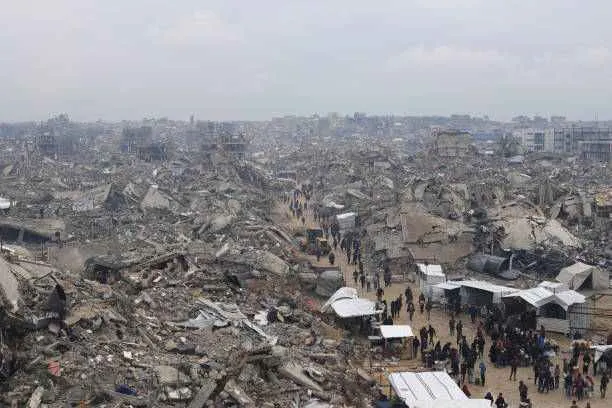Pankaj Mishra’s 'The World After Gaza' examines history and conflict
Mishra’s latest book explores identity, nationalism, and the global impact of the Israel-Hamas war.
By Novanka Laras and Sarah Oktaviany
The World After Gaza, by Pankaj Mishra
Pankaj Mishra, a renowned critic and author, grew up in a Hindu nationalist household in India during the 1970s. In his youth, he admired Israel’s resilience, viewing it as an example of overcoming adversity. His grandfather, a staunch nationalist, instilled in him a deep respect for Israel’s statehood efforts, particularly its military strength. He even hung a photo of Moshe Dayan, Israel’s defense minister during the 1967 Six-Day War, in his bedroom.
Mishra explores his evolving perspective in The World After Gaza, a book that delves into the historical, political, and ideological complexities of the Israel-Hamas conflict. He argues that violence in the Middle East has never been an isolated struggle but is entangled in the legacies of colonialism, global conflicts, and shifting political ideologies.
The nationalist lens and shifting perspectives
For Hindu nationalists, Israel’s successes highlighted what they saw as India’s failures. Mishra recalls the widespread belief that India’s partition in 1947 was a tragic consequence of weak leadership, contrasting sharply with Israel’s assertive approach to statehood. However, his perspective began to change as he explored the writings of critics of nationalism, such as Rabindranath Tagore and the Zionist thinker Ahad Ha’am.
A transformative moment came in 2008 when Mishra visited the West Bank and witnessed firsthand the struggles of Palestinians under Israeli control. He describes his shock at seeing “the persecutors of the past become the oppressors of today.” As a writer from a formerly colonized country, he saw deep racial and colonial overtones in the conflict, recognizing parallels with India’s own history of subjugation. This experience led to what he calls an “awakened, affronted sensibility.”
A broad historical framework
In The World After Gaza, Mishra takes a sweeping approach, linking the Israel-Hamas war to the broader history of decolonization. He argues that global conflicts are often mirrors of each other, shaped by the aftershocks of imperialism and racial struggles. He critiques what he sees as the transformation of Holocaust memory into a shield used to deflect criticism of Israel’s actions.
The book is heavily researched, drawing on a wide range of sources, from Holocaust survivors and historians to Black intellectuals like W.E.B. Du Bois and James Baldwin. Mishra even references Woody Allen’s 1988 op-ed in The New York Times, in which the filmmaker condemned Israel’s suppression of the first Palestinian uprising. By citing unexpected voices, he seeks to challenge dominant narratives about Israel and its role in the region.
The impact of recent events
While Mishra does not focus heavily on the October 7 Hamas attack on Israel, he examines its aftermath, particularly its effect on younger generations worldwide. He argues that many now view Israel through the lens of colonialism, seeing it as part of a broader struggle against oppression.
Decolonization, he contends, has been a defining movement of the modern era, offering the promise of equality. However, he believes Israel has positioned itself on the side of former colonial powers, reinforcing rather than resisting oppressive structures. Despite acknowledging the diverse backgrounds of Israeli Jews, he asserts that Israel has “crossed the color line” and become an oppressor in its treatment of Palestinians.
A bleak prediction for the future
Mishra’s conclusions are pessimistic. He predicts that Israel will eventually expel Palestinians from Gaza and the West Bank, reinforcing patterns of displacement seen throughout history. Initially, this seemed to be a radical forecast, but recent political rhetoric—including former U.S. President Donald Trump’s proposal to develop Gaza into “the Riviera of the Middle East”—suggests that discussions of forced relocation are becoming more mainstream.
Despite his deep engagement with history and politics, Mishra does not offer a clear vision for resistance or change. He praises campus protests supporting Palestinians but acknowledges that symbolic solidarity offers little comfort to those facing the daily realities of war and displacement.
A compelling but complex analysis
The World After Gaza is more than a personal memoir—it is an attempt to understand the global forces shaping the Israel-Hamas war. Mishra’s arguments are provocative, his historical analysis ambitious, and his tone often despairing. While his broad framing of decolonization offers new perspectives, it sometimes lacks concrete solutions. His pessimism about the future raises critical questions: Can history be rewritten, or is the cycle of violence inevitable?
Mishra’s work challenges readers to reconsider long-standing assumptions about nationalism, colonialism, and conflict. Whether one agrees with his conclusions or not, The World After Gaza is a deeply researched and thought-provoking book that forces a reckoning with uncomfortable historical truths.
Explore more in Books
- The late Ukrainian novelist and war-crimes investigator offers a poignant account of conflict.
- Julian Baggini examines the ethics, production, and cultural impact of food.
- Julie Iromuanya’s novel follows a father’s unraveling as past horrors resurface.


Post a Comment for "Pankaj Mishra’s 'The World After Gaza' examines history and conflict"